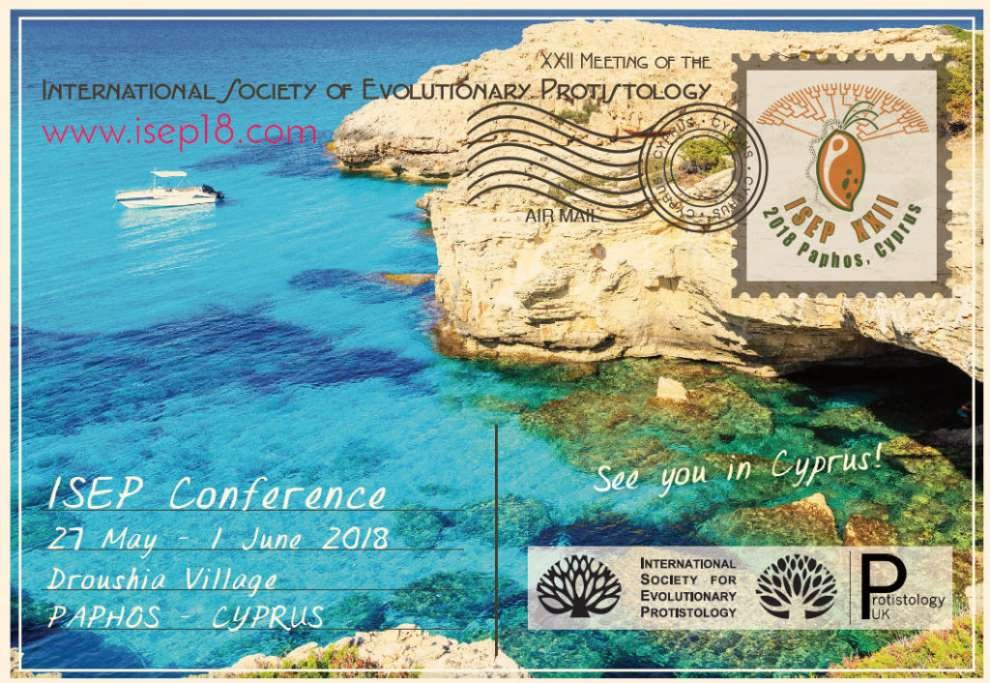- +357 - 99317260
- avgoustinos.tsaousis@gmail.com
Report on outreach events during the ISEP2018 meeting.
Anastasios D. Tsaousis1,* and Eleni Gentekaki2
* corresponding author: Dr. Anastasios D. Tsaousis (A.Tsaousis@kent.ac.uk)
In parallel with the XXII meeting of the International Society for Evolutionary Protistology (ISEP) jointly organised with Protistology-UK society and the Biological Sciences Department of the University of Cyprus in Cyprus, we organised two outreach (Open to the Public) events, which were mainly sponsored by the Society for Applied Microbiology (SfAM). Both events were incredibly successful and enabled us to engage with students and members of the public on various aspects of Protistology.
The first event, “Little monsters under the microscope” took place on Sunday, 27th of May 2018, in Droushia Heights (Droushia, Cyprus), at the conference’s venue. For this event, conference participants Dr. William Bourland (Boise State University in USA), Dr. Joel Dacks (University of Alberta in Canada and current president of ISEP), Ms. Yana Eglit (PhD student at Dalhousie University in Canada), Dr. Eleni Gentekaki (Mae Fah Luang University in Thailand), Dr. Sonja Rueckert (Edinburgh Napier University in Scotland and president-elect of ISEP) and Dr. Anastasios Tsaousis (University of Kent and event organizer) offered their combined expertise (Figure 1). During the event, the participants (high school students, their parents, teachers and visitors) were introduced to the fascinating world of Protistology, using posters, staffed giant microbes, and games (Figure 1). At the same time, researchers gave a basic introduction on the tools and techniques protistologists use to explore the diversity and evolution of protists. The participants were then able to gain some hands-on experience on isolating and visualizing samples under various microscopes. A total of 12 microscopes were used for the event, including two inverted and two dissecting microscopes (kindly provided by the University of Cyprus, the University of Kent and the American International School in Cyprus). The participants were able to observe living protists derived from cultures (Sciento, UK) and fixed samples of algae and other microbial parasites (Nicks Science Supplies, UK). Importantly, participants were given the opportunity to examine samples obtained from various extreme habitats of Cyprus (Salt Lake, Red/Iron Lake, etc). These samples were enthusiastically provided by several researchers, who arrived in Cyprus a few days before the conference and engaged in sample excursions in various areas around the island. Universal cell phone adapter mounts were installed on the eyepiece of some microscopes in order for the participants to connect their smartphones and take either photos or videos of the samples they were observing. In just a few hours, students were able to see at least 20 microbes belonging to different protistan taxonomic groups, thus exposing them to the tremendous diversity of protists in Cyprus. Thirty-seven participants registered for this event and a dozen more individuals jointed us without registering. This is a remarkable number of attendees, given that the event took place in a remote area of the island and in the middle of a long weekend national holiday. At the end of the event, participants received a certification of attendance.
The second event took placed on the 1st of June 2018, at the American International School in Cyprus (AISC) in Nicosia (Cyprus), under the umbrella of “Café Scientifique”. Forty-six participants registered for this event, that was also sponsored by the AISC. In addition to the registered students, teachers and Head of Sciences departments from various Schools, and the President of the Biological Society of Cyprus (member of the Federation of European Biochemical Societies), Mikis Hadjineophytou, also attended the event. The event started with a warm welcome note from the AISC director, Dr. Michelle Kleiss, followed by a brief introduction by Dr. Anastasios Tsaousis. Four academic researchers then took the podium, each delivering a short, concise lecture on aspects of their research. Dr. Juan Saldarriaga from the University of British Columbia in Canada provided an introduction on single cell eukaryotes and their diversity. Dr. Eleni Gentekaki from Mae Fah Luang University in Thailand explained the molecular and phenotypic differences in protists and the importance of these differences in diagnostic parasitology. Afterwards, Dr. Anna Karnkowska from the University of Warsaw in Poland introduced the audience to the fascinating world of colourful protists that carry plastids and explained how these plastids arose through a secondary endosymbiosis event. Lastly, Dr. Joel Dacks from the University of Alberta in Canada discussed the evolution and diversity of membrane trafficking system of these microbial organisms accompanied by microscopy images of membrane trafficking organelles. At the end of the talks and for one hour, the participants had the opportunity to directly interact with the speakers (Figure 2). Discussion took place in a round table format. Students actively participated and discussed the latest theories and practices in the field of Microbiology/Protistology and Eukaryotic Evolution. All the participants received a certification of attendance, and the Head of the Sciences’ departments exchanged contacts with the academics to establish future collaborations between the local schools and universities.
In both events, students had the opportunity to interact with active researchers and ask questions not only about protistology, but also about what it means to be a scientist, and how scientific hypotheses are formulated and tested. The events were highly publicized in social media and received national and international attention.
We would like to thank all of our sponsors for supporting and promoting these events: University of Cyprus, University of Kent, American International School in Cyprus (especially Avgoustinos Tsaousis from AISC for organizing the Café Scientifique), International Society for Evolutionary Protistology, and especially the Society for Applied Microbiology.
For more information about the event and relevant photos, please see:
Twitter: #isep18outreach, #isep18
ISEP18 website: www.isep18.com http://www.isep18.com/open-for-the-public/
Figure 1: Photos taken during the “Little Monsters under the microscope” event in Droushia.

Figure 2: Photos taken during the “Café Scientifique” event in Nicosia.
